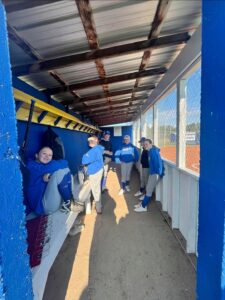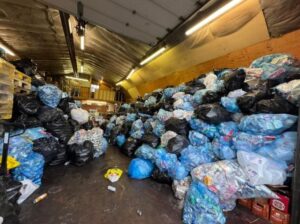During the spring and summer months, Rotary Park is the place to be. For the avid users, bird poop, specifically from the resident Canada geese, can be a problem, especially in the grass around the pond. Poop has even been found further up in the soccer fields and playground area. Each year, the Town of Whitecourt implements techniques to encourage the national bird to settle down somewhere else so that the poop can be mitigated.
Kelly Magee, Parks and Open Spaces Coordinator, said keeping the numbers of geese down is a vital part of keeping the poop down. “As geese get more familiar, they will return to the same area. If it’s a safe area, then their babies will follow them back too, and we will eventually end up with a large population at the pond.” Last year, Magee said there were only two families of geese. However, they had 30 goslings. “That was a huge amount of poop. We have teams that try to keep ahead of it. They go out each morning and pick up everything on the pathways or in the play areas, but if it is on the grass, we can’t care for that. We just hope that it dries, and then we mow it over.”
If even half of the 30 goslings from last year decide to return to Rotary Park pond, the area would be overtaken with feces, presenting an even bigger issue. “The amount of poop could end up in the pond, and pond water is used in the slides. If the water becomes contaminated, then the slide cannot run. I’m not sure of the level that would contaminate the pond water, but we are trying to stay ahead of it so that the problem doesn’t become too big.” Magee said the water is tested weekly when the slides are running, and the data gets sent to Alberta Health. The water coming out of the splash park is not affected since it is treated water from the tap.
To keep geese numbers down, Magee said they are trying a couple of new things this year. “We implemented the light system and the sound system together. Last year we just did lights and owl predators on posts, but it did not seem to help at all. We also hired a wildlife specialist to come every day of the week to chase the geese. He has a dog with him, and he wears a bright suit so that the geese see him coming. He uses drones when he can or a remote-controlled boat on the pond. If he chases the geese and they end up on the pond, then he puts his boat in the water and chases them from the pond.” She explained that they need a Canadian government permit since the birds are protected under the Migratory Bird Act. “The dog is always on a leash, and we never try to come into contact with them at all. If something does happen, we have to account for that with the Canadian Government.”
The light system they use flashes red near the edge of the pond. “They come on at night and flash at different times. It’s meant to disturb their sleep because it’s something different, and it’s red to represent predator’s eyes.” Magee chuckled that humans might see the light that way but that geese might not. “It’s supposed to throw them off a bit, we hope.” The sound system they have working with the light is a distressed goose call. “It goes on for about a minute and a half, and then it shuts off for a bit. I have watched it while it went off, and the geese kind of look around. The wildlife specialist said that it was actually a good sound because he has heard ones used elsewhere that sounded more like a dinner bell for the geese rather than a distress call,” she laughed.
Magee said that her crew continues to check the area around the pond for nests. “If they find one, they will dismantle it so that it isn’t a nest anymore. They usually remove the materials too so that the geese cannot come back and rebuilt them. They are also looking for eggs, but they haven’t found any yet.”
Magee added that residents are not allowed to chase the birds themselves. Since they are protected, fines could follow those who harm or kill one. “Once the babies are born, the parents moult, and they can’t fly. At that point, we can’t try and get rid of them anymore.” She said that the timeframe changes every year depending on the area. “The Wildlife Specialist said that to the south of us and into Edmonton area, they have already laid their eggs and are pretty well done, but here they have not found too many nests with eggs in them.”
As for the poop, Magee said that each year residents call thinking that the issue is due to dog owners not picking up after their animals. “It’s a big poop for a bird, and they tend to poop a lot. It is just basically grass and things like that, so it is not really harmful, but after it builds up, it becomes harmful. We all like birds, and we really don’t want to chase them away, but it is a problem, and it is for the health of the people who use the pond or use the slides. We want to make sure they are safe. They are cute and lovely when they are tiny, but as they get bigger, that changes.”
She said the geese do not typically hang out all summer but that there is still a chance the geese find their way back to the pond since the wildlife specialist left at the end of May. “What works in one place might not work in another, and each year is different. It also depends on how dedicated that bird is to stay. We are just trying to move them to a place that is better for them and everybody else.”








More Stories
Community spirit shines at large-scale youth baseball event
Birthday party chaos sung beautifully by Pumpjack Players’ youth in spring musical
Gearing up for another season of cars, cruising and camaraderie